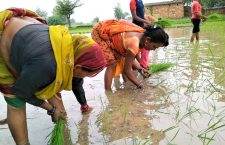Veena Soni could become just another statistic in India’s high fatality rate by female sterilisation. The young mother of two, who had undergone a tubectomy in 2014 at the local Community Health Centre (CHC) in Tarun block of Faizabad, UP, had never imagined that the surgery could lead to a life threatening situation, so many years later. Tubectomy or tubal ligation is a surgical procedure to block the fallopian tubes that convey eggs to the ovaries, and thereby prevents a pregnancy. She is 3-and-half-months pregnant today and the baby is in fact growing inside her fallopian tube.
After feeling persistent pain for some time, she has only recently established her pregnancy when, after many consultations, one doctor finally advised her to go for an ultrasound. The medicine and injections provided some respite from the pain and frequent vomiting while she awaits further treatment. She has to be cautious in her every move as the fallopian tubes could otherwise burst.
Her husband Surendra Soni is the sole earning member and has a hardware re-sale business. He says, “Many doctors made us run around and we could have never guessed it was due to a pregnancy. How is it possible after the operation?” Despite doctors warning her about the dangerous situation, Veena reports that the doctor at the CHC in Tarun told her to not take any medicine as it would be okay, and that the baby would ‘fall off’ on its own.
As for the others, Surendra says, “How can doctors at the ‘biggest hospital’, Mary Queen (Lucknow), let us off with just a warning that anything can happen at any time?” What is in fact delaying her operation is a mere documentation holdup that needs to establish that her sterilisation has been a failure. Only then would the family receive compensation for the unaffordable surgery. The Family Planning Indemnity Scheme 2005, states that the woman can claim compensation with district authorities within 90 days of the “occurrence of the event of death/failure/complication”. But government officials sometimes interpret this time period as starting from the date of pregnancy or from the date of the surgery.
The current delay has made the harrowed couple even approach the district magistrate of Faizabad, who they say has promised to quicken the process. Though her fate lies uncertain, Veena’s case is one more casualty to India’s skewed family planning policies. Even the government has acknowledged this in the latest 11th Common Review Mission report of the National Health Mission which states:
“Women continue to bear an uneven burden of the terminal methods of family planning and sterilisation. As per HMIS in 2017-18 (till October) of the total 14, 73,418 sterilisation procedures only 6.8 % were male sterilisation while 93.1 % were female sterilisation.”
This is despite the fact that more than 1,000 women have died in the five years up to 2015-16 as a result of tubectomy related surgeries and that a vasectomy is an easier and safer procedure as compared to a tubectomy.
The latest National Family Health Survey 2015-16 also reported that only 5.6% of those surveyed used condoms as a preferred method of birth control, and thereby women are left to figure out other means. Though the numbers indicate something that is beyond skewed, one needs to look at why this is the case.
Though India is the first country to have introduced a population control policy in the 1950s, it has consistently missed its targets since then. In the 1970s, the focus shifted to sterilisation as a means of family planning, with rigid target setting and quotas for vasectomies. Many men were forced into government camps that led to many deaths. Since then, there has been a social stigma around vasectomies, and instead the focus has been on sterilising poor women. However the camp-style mass sterilisation was ordered to be phased out by the Supreme Court in 2016, after one camp led to mass deaths of poor women in 2014 in Chhattisgarh.
Today, though women are operated on an individual basis, they are still not made aware of any of its dangers and complications, especially on women with anemia, heart and lung disease, weakness and other health conditions. Newer forms of contraception introduced by the government are again meant only for women.
All these perhaps stem from the fact that are no male health workers at the community-level and the ASHA workers’ interactions are mostly with women regarding family planning options. Veena too had opted for the tubectomy on the advice of her ASHA worker, and the CHC at Taarun does not offer any vasectomy facilities.
This Khabar Lahariya article first appeared in The Wire

